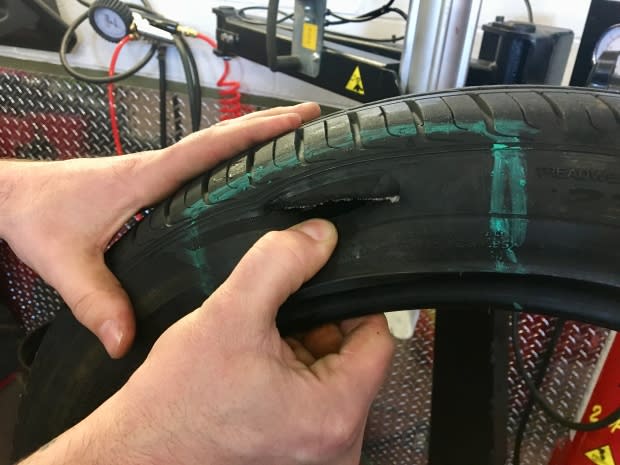4 tips to care for your car during pothole season
There's no way of getting around it, pothole season is upon us. It's common to see drivers swerve around the concrete craters or regrettably drive into them, only to pray no damage has been done.
Sometimes they can be unavoidable, especially when ice and snow hide them in plain site.
Here are some tips on how to drive during pothole season, what up-keep your car may need and what to do if you encounter the dreaded depressions.
1. Slow down
Wayne MacFarlane, an instructor at Abegweit Driving School, said slowing down at this time of year is crucial.
"Make sure that you increase your following distance. That way you'll be able to see the potholes a little bit sooner," he said.
"Keep your windshields clean, keep your headlights clean and slow down."

He also suggests staying away from roads that are in bad shape and taking alternative routes.
"I think the number one word would be to stay vigilant because we know they're there," said MacFarlane.
He said potholes won't be going away anytime soon, so adjusting your driving is important.
2. Check your tire pressure
MacFarlane also suggests keeping an eye on tire pressure, and ensuring tires are fully inflated.
Connor Barrett, one of the owner's at Vision Auto and Tire reiterated this point.

"There can be damage done to a tire without necessarily knowing visually from the outside," Barrett said.
"So if the tire is running low on air, or if the rim is bent, it can seep out, it can go flat several days down the road. Or you can be driving on lesser air pressure and the tire itself can wear against itself and be not as structurally sound."
3. Shaky steering wheels may indicate a problem
Barrett said a shaky or rattling steering wheel can be caused from hitting a pothole, and recommends bringing your car to a professional.
"If you have any shakes in the steering wheel or any rattles or anything like after an impact, it's always best to have it checked out," he said.

"Sometimes you can get it where it won't show any symptoms, but may have done some damage and could jeopardize structural integrity. So it never hurts — you kind of use a gut check to figure out when's the best time to go in."
4. Maintenance, maintenance, maintenance
Barrett said the best thing to do with the unpredictable weather and changing road conditions is to stay on top of your car's care.
"I know everybody likes to kind of wait it out and see if anything drastic is going to happen, but it never hurts to have a vehicle checked over if you've hit a fairly severe pothole."
More P.E.I. news

